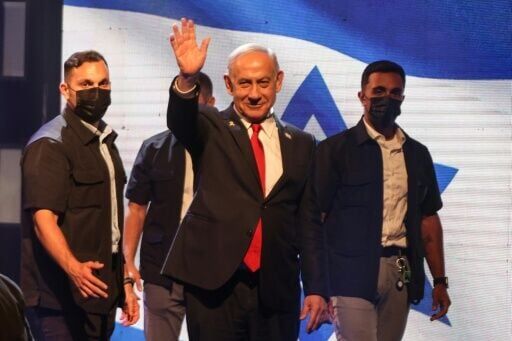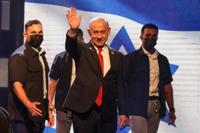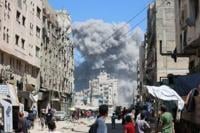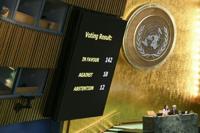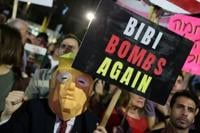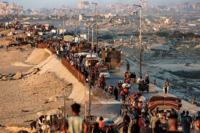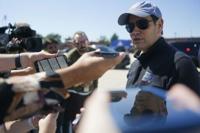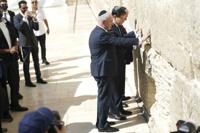Prime Minister Benjamin Netanyahu said Sunday that a visit to Israel by top US diplomat Marco Rubio underscored the strength of ties between the allies, days after an unprecedented Israeli strike targeting Hamas leaders in Qatar drew broad criticism.
The attack on the US ally and key mediator in Gaza truce talks has prompted Arab and Muslim leaders to gather for a show of solidarity in Doha, where Qatar's prime minister urged the world to reject "double standards" and hold Israel to account.
US leader Donald Trump rebuked Israel over Tuesday's strike, and Rubio acknowledged to reporters before departing Washington that the president was "not happy" about it, but he insisted the attack would not "change the nature of our relationship with the Israelis".
Nevertheless, the strike has put renewed strain on efforts to secure a ceasefire in Gaza, and Rubio allowed that the United States and Israel were "going to have to talk about" its impact.
Netanyahu has defended the operation -- which targeted Hamas officials gathering to discuss a new US ceasefire proposal -- saying killing the group's leaders would remove the "main obstacle" to ending the Gaza war.
On Sunday, Rubio offered prayers at Jerusalem's sacred Western Wall alongside Netanyahu and US ambassador to Israel Mike Huckabee, an AFP correspondent reported.
Netanyahu said afterwards that the visit showed the Israeli-American alliance was "as strong, as durable as the stones in the Western Wall that we just touched".
Under Rubio and President Donald Trump, "the alliance has never been stronger", he added.
Rubio's main meetings with officials, including Netanyahu, will take place on Monday before he departs on Tuesday.
His visit coincides with Monday's emergency summit of Arab and Muslim leaders in Qatar, whose Prime Minister Sheikh Mohammed bin Abdulrahman Al Thani addressed a preparatory meeting on Sunday.
"The time has come for the international community to stop using double standards and to punish Israel for all the crimes it has committed," he said, adding Israel's "war of extermination" in Gaza would not succeed.
"What is encouraging Israel to continue... is the silence, the inability of the international community to hold it accountable."
- 'Constant terror' -
In spite of mounting international criticism, Israel has in recent days ramped up efforts to seize control of Gaza City, the territory's largest urban centre, telling residents to evacuate and blowing up numerous high-rise buildings it said were being used by Hamas.
As of late August, the UN estimated that around one million people were living in the city and its surrounding areas, where it has declared a famine it blamed on Israeli aid restrictions.
AFP images showed a column of vehicles and people on foot fleeing Gaza City southwards through a desolate landscape of destroyed buildings.
"We are living in constant terror amid relentless shelling and powerful explosions," said Sara Abu Ramadan, 20, a resident of Gaza City.
"Why such massive firepower in these rockets? What's their goal? We are dying here, with nowhere to seek refuge... and the world just watches."
Gaza's civil defence agency said at least 45 people had been killed since dawn Sunday in Israeli strikes around the territory.
Media restrictions in Gaza and difficulties in accessing many areas mean AFP is unable to independently verify the details provided by the civil defence agency or the Israeli military.
On Friday, the UN General Assembly voted to back a revival of the two-state solution, in defiance of Israeli opposition.
Nevertheless, Israel retains the backing of its most powerful ally and biggest arms supplier, the United States.
- 'Alarming passivity' -
At home, opponents of the Netanyahu government have sought to pressure ministers to end the war in return for the release of Israeli hostages held in Gaza.
On Saturday, the Hostages and Missing Families Forum, the main campaign group for the captives, accused the Israeli premier of being the "one obstacle" to freeing the hostages by sabotaging efforts to strike a deal.
Of the 251 people taken hostage by Palestinian militants in October 2023, 47 remain in Gaza, including 25 the Israeli military says are dead.
Brian Katulis, a senior fellow at the Middle East Institute, said Rubio was unlikely to push Israel toward a ceasefire.
"There is an alarming passivity in actually getting to a ceasefire in Gaza," said Katulis, who worked on Middle East policy under former president Bill Clinton.
The war was sparked by Hamas's October 2023 attack on Israel, which resulted in the deaths of 1,219 people, most of them civilians, according to an AFP tally of official figures.
Israel's retaliatory campaign in Gaza has killed at least 64,871 people, also mostly civilians, according to figures from the health ministry in Hamas-run Gaza that the United Nations considers reliable.
sct-jd/dcp/smw



